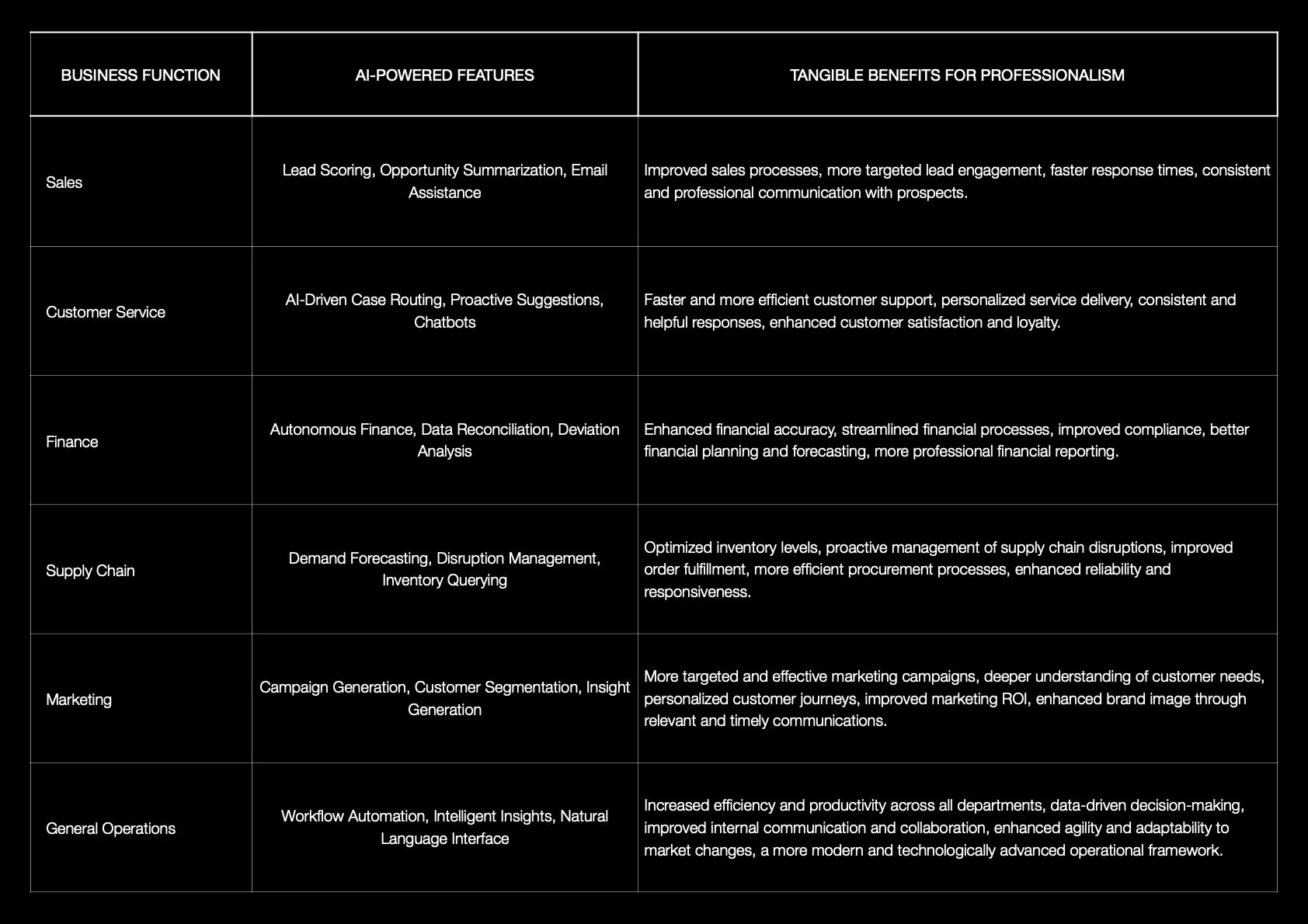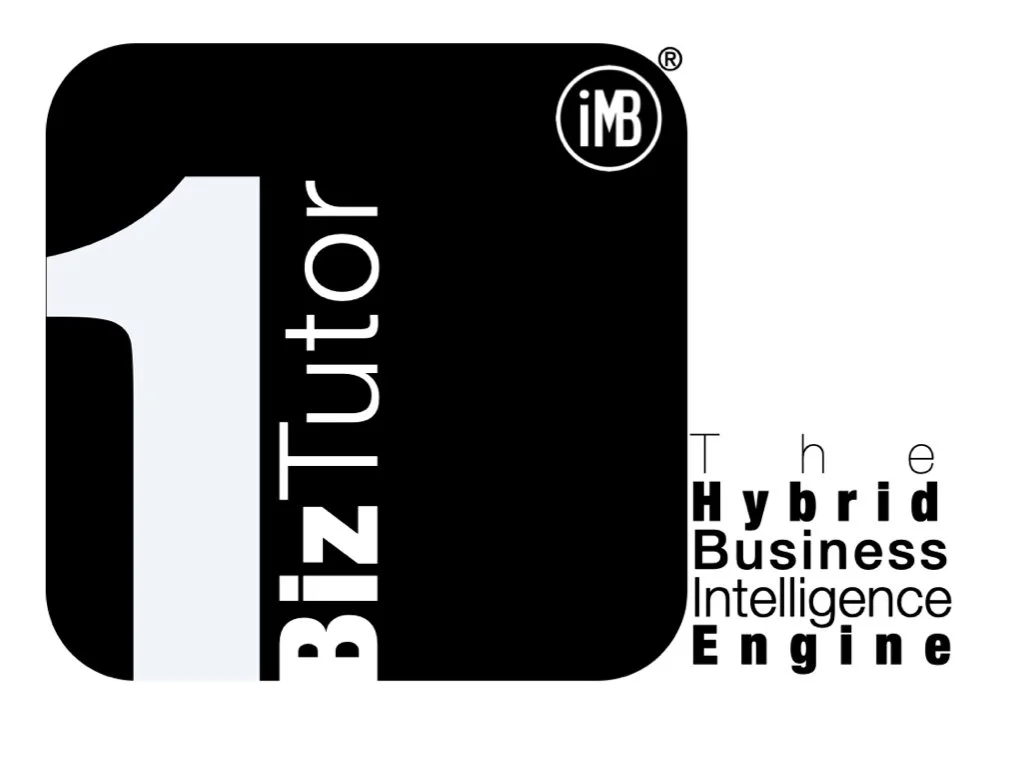Microsoft Dynamics 365: The AI Advantage for Medium-Sized Businesses
Preface
Medium-sized companies are constantly seeking ways to optimize their operations, enhance customer engagement, and maintain a competitive edge. Microsoft Dynamics 365 emerges as a comprehensive suite of intelligent business applications, offering solutions for customer relationship management (CRM) and enterprise resource planning (ERP) that cater to a wide array of business needs, from managing sales and customer service to overseeing finance and supply chain operations.
The integration of artificial intelligence (AI), particularly generative AI, is becoming increasingly crucial for businesses looking to drive innovation, effectively tackle complex challenges, and deliver highly personalized experiences to their customers. Within Dynamics 365, generative AI, primarily delivered through Microsoft Copilot, acts as a powerful tool designed to significantly enhance productivity, unlock valuable insights from business data, and elevate customer interactions by automating routine tasks and generating relevant content.
This blog, based on our experiences from project missions, delves into how Microsoft Dynamics 365 strategically incorporates generative AI to provide substantial benefits for medium-sized businesses. It will explore the fundamental distinctions between Large Language Models (LLMs) and Small Language Models (SLMs), and elucidate Microsoft's strategic rationale for their combined deployment within the platform.
Unlocking Potential: How Generative AI is Integrated into Dynamics 365
Generative AI within Microsoft Dynamics 365 is predominantly powered by Microsoft Copilot, an intelligent AI assistant that is seamlessly embedded across various applications within the suite. Copilot's primary function is to empower employees by automating tasks, generating innovative ideas, and providing insightful information directly within their workflow, allowing them to concentrate on activities that truly matter.
In Dynamics 365 Sales, Copilot serves as a dedicated AI assistant to sales teams, significantly enhancing their daily productivity. It enables salespeople to quickly access summaries of their opportunity and lead records, stay informed about recent changes, efficiently prepare for upcoming meetings by gathering pertinent information, and receive timely news updates concerning their key accounts.
Furthermore, AI plays a crucial role in identifying and prioritizing high-quality leads by analyzing various data points and providing detailed sales-related data, thereby enabling sales teams to focus their efforts on the most promising prospects. Copilot leverages its generative AI capabilities to automate several time-consuming tasks, including drafting personalized email replies, generating concise meeting summaries, and ensuring customer records are accurately updated, drawing information from seamlessly integrated Microsoft services such as SharePoint, Outlook, and Microsoft Teams.
Continuous enhancements to Dynamics 365 Sales include the provision of sales potential insights, AI-driven lead identification, and an improved meeting experience designed to optimize seller effectiveness. The seamless integration of Copilot with familiar tools like Outlook and Teams facilitates efficient data management, while its generative AI features enable rapid record summarization and streamlined email content creation, ultimately improving the overall workflow for sales professionals.
Moreover, Dynamics 365 Sales introduces new Copilot and AI agent capabilities aimed at simplifying the process of researching and prioritizing inbound leads, initiating meaningful sales conversations, and developing highly personalized sales engagements.
Within Dynamics 365 Customer Service, Copilot acts as a valuable resource for service agents, helping them to resolve customer issues more swiftly and efficiently. It assists agents in accurately diagnosing problems, prompting them with relevant follow-up questions to gather necessary details, and facilitating the discovery of effective solutions through AI-powered chat functionalities.
Agents can also utilize AI to generate personalized chat or email responses tailored to the specific customer's needs and tone, drawing upon real-time conversation context and trusted support resources. New Copilot features in Dynamics 365 Customer Service offer proactive suggestions to aid in issue resolution, provide secure access to external data through add-ins, enhance email communication capabilities, and implement AI-driven case routing to ensure customers are connected with the most appropriate agent. Copilot also provides service representatives with real-time insights, including sentiment analysis to gauge customer emotions, translation services for multilingual support, transcriptions of customer interactions, and AI-recommended knowledge articles to expedite issue resolution.
In the realm of Dynamics 365 Finance, AI is transforming traditional financial processes, driving the evolution towards autonomous finance where many routine tasks are handled automatically. Copilot capabilities embedded within the Finance application help to automate these routine processes and dynamically adapt workflows to align with evolving business requirements, freeing up finance professionals to focus on more strategic initiatives.
For collections managers, Copilot significantly boosts productivity by providing AI-generated summaries of customer accounts, highlighting overdue invoices, and offering insights into payment history, thereby aiding in effective prioritization and customer communication.
New features include intelligent assistance with data reconciliation within Excel, deviation analysis to identify anomalies, improved collaboration tools, and seamless integration with Microsoft Teams, all aimed at enhancing financial management workflows through the power of AI.
Furthermore, in Dynamics 365 Project Operations, AI can rapidly generate written project status reports, detailed task plans, and comprehensive risk assessments, significantly improving project management efficiency.
Dynamics 365 Supply Chain Management is also undergoing a significant transformation through the deep integration of AI, automation, and advanced analytics, moving towards the vision of an autonomous supply chain that optimizes the entire process. Copilot proactively identifies potential external disruptions that could impact critical supply chain processes, provides predictive insights into affected orders, and assists in drafting timely emails to alert relevant partners, contributing to a more resilient and efficient operational framework.
AI plays a vital role in optimizing sourcing decisions and predicting the potential impact of various factors across suppliers, materials, and overall inventory levels, enabling businesses to make more informed planning and risk mitigation decisions.
Additionally, users can leverage the power of natural language to inquire about current inventory stock levels, interacting with the system in a conversational manner similar to communicating with a colleague, making crucial inventory information readily accessible.
For Dynamics 365 Customer Insights—Journeys, generative AI and marketing automation are combined to revolutionize how marketers engage with customers and optimize their interactions. The platform's 2024/25 updates focus on simplifying the creation of marketing flows using natural language and advanced multimodal generative AI capabilities, as well as enabling the generation of entire marketing campaigns with the assistance of generative AI and Copilot.
Copilot empowers marketers by helping them uncover valuable customer insights, create highly targeted customer segments, generate innovative ideas for email and marketing campaign content, and build comprehensive customer journeys using intuitive natural language prompts, ultimately enhancing the effectiveness of marketing efforts.
Beyond these core applications, the Microsoft Power Platform, which forms the foundation for Dynamics 365, also benefits from significant generative AI integration. This includes simplifying the creation of automated workflows in Power Automate through natural language and multimodal AI capabilities.
Copilot Studio leverages generative AI to empower both professional and citizen developers in creating and enhancing applications and automated workflows.
AI Builder, a powerful tool within the Power Platform, focuses on its Prompt Builder feature, allowing users to easily create and deploy sophisticated GPT prompts using their own business data to enhance flows, applications, data tables, and even copilots, all without requiring deep expertise in AI.
Overall, copilots and generative AI features within the Power Platform and Dynamics 365 are designed to help users build innovative applications, automate complex flows, create intelligent chatbots, effectively analyze their data, efficiently summarize key information, quickly reply to messages, and generate novel ideas across a wide spectrum of business functions.
Decoding the AI: Large Language Models (LLMs) vs. Small Language Models (SLMs)
Large Language Models (LLMs) are sophisticated AI models distinguished by their massive scale, often comprising billions or even trillions of parameters – the intricate weights that dictate the model's behavior.
These models are trained on colossal datasets, frequently encompassing vast swathes of the internet, equipping them with a broad understanding of general knowledge and exceptional capabilities in generating human-like text and comprehending natural language.
LLMs excel at a diverse range of natural language processing tasks, including accurately translating languages, efficiently summarizing extensive texts, and providing insightful answers to a multitude of complex questions with remarkable fluency and coherence. Their primary strength lies in their ability to discern intricate patterns and relationships within language, leading to high performance across various natural language processing applications and often demonstrating superior accuracy in producing human-quality text.
However, the sheer size and complexity of LLMs necessitate substantial computational resources, including powerful hardware like GPUs or TPUs, for both the intensive training process and the subsequent inference, making them computationally expensive to operate and often requiring deployment in cloud-based environments. Due to their training on such expansive and varied datasets, LLMs can sometimes exhibit biases or generate inaccuracies, commonly referred to as hallucinations, and also raise ethical considerations concerning the potential for spreading misinformation and compromising privacy.
Furthermore, the inference speed of LLMs can be slower, particularly when a large number of users are concurrently accessing the model, which can potentially impact the performance of real-time applications. Notable examples of prominent LLMs include ChatGPT, powered by the advanced GPT-4 architecture, Google's innovative Gemini model, and Meta's widely used Llama family of models.
In contrast, Small Language Models (SLMs) are characterized by their smaller scale and more streamlined architecture compared to their larger counterparts, typically containing parameters ranging from a few million to several billion.
These models are trained on more focused datasets specifically tailored to particular industry domains or specific tasks, enabling them to develop highly specialized knowledge and often surpass the performance of general-purpose LLMs in terms of precision and speed when addressing targeted queries within their area of expertise.
SLMs are significantly more lightweight and resource-efficient, making them well-suited for deployment in environments with limited computational capabilities, such as personal laptops, smartphones, and various Internet of Things (IoT) edge devices. They offer distinct advantages in terms of processing speed, memory usage, and overall energy consumption, making them particularly attractive for real-time applications where low latency and efficient resource utilization are critical. SLMs are generally faster to train, easier to fine-tune for specific tasks, and quicker to deploy, requiring less computational power and memory, which translates to lower costs and greater accessibility for a wider range of organizations, including smaller businesses. Due to their training on smaller, more curated, and domain-specific datasets, SLMs typically pose a lower risk of generating biased or inaccurate outputs, leading to more reliable and relevant results within their defined area of expertise.
While their capabilities may not be as broad as those of LLMs, SLMs excel in their specific domains and can be readily and cost-effectively fine-tuned using techniques like repeated sampling to achieve a high level of accuracy for relevant tasks within a limited scope. Examples of effective SLMs include Mistral's efficient Mixtral 8x22B model and Microsoft's versatile Phi family of language models.
The Strategic Synergy: Why Dynamics 365 Leverages Both LLMs and SLMs
Microsoft's AI strategy for Dynamics 365 is built upon a foundation of strategic synergy, intelligently combining the distinct strengths of both Large Language Models (LLMs) and Small Language Models (SLMs) to deliver an optimal blend of performance, cost-effectiveness, and a comprehensive suite of AI-powered capabilities throughout the platform.
LLMs are leveraged for their broad understanding of language, their versatility in handling diverse tasks, and their ability to comprehend complex, nuanced queries. They excel in scenarios requiring the generation of sophisticated content, such as crafting personalized marketing materials, summarizing extensive customer interactions to provide a holistic view, and accurately interpreting open-ended natural language inquiries that may involve intricate context.
Conversely, SLMs are strategically deployed for their efficiency, speed, lower latency in processing requests, and overall cost-effectiveness, particularly when addressing specific, targeted tasks within the various Dynamics 365 modules. These models are ideal for scenarios such as quickly retrieving precise customer data points, providing instant and accurate responses to frequently asked questions through AI-powered chatbots, and enabling on-device processing in resource-constrained environments, such as those encountered by field service technicians.
Microsoft employs advanced techniques like model distillation, where the extensive knowledge of a large, complex LLM is transferred to a smaller, more efficient SLM, and fine-tuning, which involves further training a pre-existing model on specific, curated datasets, to optimize both LLMs and SLMs for their intended applications within Dynamics 365. This ensures that the most appropriate type of model is utilized for each specific use case, maximizing performance while minimizing resource consumption.
This combined approach yields several key benefits for medium-sized businesses:
Optimal Performance: By carefully selecting the most suitable model for each task, whether it's the broad understanding of an LLM or the focused efficiency of an SLM, Dynamics 365 ensures high accuracy, relevant responses, and efficient processing across its diverse functionalities.
Cost Efficiency: Utilizing SLMs for simpler, high-volume tasks significantly reduces the overall computational load and the associated operational costs compared to relying solely on the more resource-intensive LLMs for every AI-powered feature within the platform.
Scalability: The modular nature of this hybrid strategy allows Microsoft to efficiently scale AI capabilities across the various Dynamics 365 modules and effectively cater to a wide range of user needs and diverse business scenarios as the platform continues to evolve and expand.
Flexibility: This strategic combination provides the inherent flexibility to adapt to a wide array of use cases, incorporate future technological advancements in AI, and meet the specific requirements of medium-sized businesses operating across different industries, enabling the delivery of tailored AI solutions within the Dynamics 365 ecosystem.
Consider these examples of how this strategic synergy might function in practice within Dynamics 365 for medium-sized companies:
In Dynamics 365 Sales, Copilot might leverage an LLM to generate a highly personalized and compelling introductory email to a prospective client, drawing upon extensive market research and a deep understanding of the client's specific industry. Simultaneously, it could employ an SLM to quickly locate and retrieve the precise contact information for the most relevant decision-maker within that organization.
Within Dynamics 365 Customer Service, an LLM could be utilized to accurately interpret a complex and nuanced customer issue described in natural language, capturing the full context and intent. Subsequently, an SLM that has been specifically fine-tuned on a detailed product knowledge base could be engaged to rapidly provide the service agent with a precise and effective solution to the customer's problem.
For field service technicians utilizing Dynamics 365 in remote locations with potentially unreliable internet connectivity, an SLM could be deployed directly on their mobile device to offer immediate access to critical equipment manuals and step-by-step troubleshooting guides. Meanwhile, a more powerful LLM operating in the cloud could handle more complex diagnostic analysis and provide advanced support when a stable internet connection is available.
Elevating Operations: Tangible Benefits for Medium-Sized Companies
The integration of generative AI into Microsoft Dynamics 365 offers a multitude of tangible benefits that can significantly elevate the operations of medium-sized companies. These advantages span across various critical business functions, ultimately contributing to enhanced efficiency, stronger customer relationships, and a more professional organizational image.
By automating repetitive and time-consuming tasks such as data entry, report generation, and drafting routine emails through AI-powered features like Copilot, medium-sized businesses can free up valuable employee time. This allows their workforce to focus on more strategic and high-value activities that directly contribute to the company's overall growth and success. The intelligent insights and data-driven recommendations provided by AI within Dynamics 365 empower employees across different departments to make faster and more informed decisions, leading to improved operational agility and better business outcomes.
Furthermore, the streamlined workflows and processes facilitated by AI-powered automation and seamless integration across various Dynamics 365 modules help reduce manual errors, minimize operational redundancies, and enhance overall efficiency, resulting in significant cost savings and improved resource utilization. In crucial areas like sales, AI-powered assistance in lead prioritization, opportunity management, and sales forecasting enables sales teams to concentrate their efforts on the most promising prospects, optimize their sales strategies, and ultimately drive revenue growth more effectively. The real-time data access and comprehensive analytics, enhanced by AI-driven insights, provide medium-sized businesses with greater visibility into their day-to-day operations, allowing them to proactively identify potential bottlenecks, address emerging challenges swiftly, and optimize performance across all departments.
The AI capabilities within Dynamics 365 also play a crucial role in strengthening customer relationships. Personalized interactions with customers, driven by AI-powered insights into their specific behavior, preferences, and past interactions, lead to higher levels of customer satisfaction, increased customer loyalty, and the development of stronger, more enduring business relationships. Enhanced customer service capabilities, including AI-powered chatbots that provide instant support, proactive suggestions for service agents to improve their responses, and faster overall issue resolution times, significantly improve the overall customer experience and build a strong reputation for providing exceptional service. The deeper understanding of customers gained from unified data across sales, service, and marketing, facilitated by AI-powered analytics, enables medium-sized businesses to tailor their product and service offerings more precisely, personalize their communications effectively, and anticipate customer needs with greater accuracy.
Moreover, the improved communication and collaboration across internal departments, facilitated by the integrated nature of Dynamics 365 and AI-powered information sharing, ensure a consistent and seamless experience for customers across all points of interaction, enhancing the company's professionalism and building a strong foundation of trust.
Beyond efficiency and customer relations, Dynamics 365 with AI significantly enhances the overall professionalism of medium-sized companies. Improved data management practices, facilitated by a unified platform with AI-powered data validation and cleansing features, ensure greater data accuracy, consistency, and security, projecting a more reliable and trustworthy image to both customers and business partners.
Consistent and professional communication with customers, powered by AI-assisted personalized messaging and tone analysis, ensures that all customer interactions consistently reflect the company's established brand values and unwavering commitment to quality. By adopting a modern and innovative approach to business operations through the strategic leverage of cutting-edge AI technology, medium-sized businesses demonstrate a forward-thinking mindset and a clear commitment to continuous improvement, thereby enhancing the company's overall reputation and attracting top talent in the industry. The enhanced reporting and analytics capabilities, driven by AI-powered insights, provide a more professional and data-backed method for tracking critical business performance metrics, making informed strategic decisions, and presenting key information to stakeholders, fostering greater confidence and credibility in the company's operations.
Furthermore, the seamless integration of Dynamics 365 with other widely used Microsoft products like Office 365 and Microsoft Teams creates a cohesive, efficient, and professional work environment, significantly enhancing internal collaboration and streamlining essential business processes.
Conclusion: Embracing the Future of Business with AI-Powered Dynamics 365
The integration of generative AI, particularly through the robust capabilities of Microsoft Copilot, into Microsoft Dynamics 365 presents a transformative opportunity for medium-sized businesses. This powerful combination unlocks new levels of operational efficiency, strengthens critical customer relationships, and significantly enhances overall professionalism. Microsoft's strategic approach of intelligently leveraging the distinct strengths of both Large Language Models (LLMs) for complex, nuanced tasks and Small Language Models (SLMs) for efficient, targeted operations ensures a balanced and highly optimized AI experience across the entire platform.
Medium-sized business owners and managers are encouraged to embrace AI not merely as an incremental upgrade, but as a fundamental shift in how they conduct their operations, offering a clear pathway to becoming more agile, highly responsive to market dynamics, and increasingly competitive within the evolving digital landscape. To explore these powerful capabilities further, businesses are advised to request a personalized demonstration of Dynamics 365, consult with Microsoft partners who possess specialized expertise in AI implementation, or delve into the wealth of resources readily available on the official Microsoft Dynamics 365 website.
Ultimately, the future of business is inextricably linked with the intelligent application of AI, and Microsoft Dynamics 365 stands as a leading platform, uniquely empowering medium-sized organizations to not only effectively adapt to this profound technological revolution but to truly thrive in an era defined by intelligent automation and the amplification of human potential.
Harnessing the Best of Both Worlds: How OneBizTutor® Draws Inspiration from LLMs and SLMs for Revolutionary B2B Insights
Now let's chat about something that's got us at iMB.Solutions buzzing with excitement—the ingenious fusion that's powering OneBizTutor® - The Hybrid Business Intelligence Engine. If you're like us, always on the hunt for smarter, faster ways to turn B2B visions into victories, then stay tuned. We're diving into how OneBizTutor® draws profound inspiration from the comparative strengths of traditional Large Language Models (LLMs) and the lean philosophy of Small Language Models (SLMs), all while channeling the client-centric magic of Microsoft Dynamics 365 into our custom Micro Small Language Model (M-SLM). In our opinion, this isn't just clever engineering—it's a bold leap forward, solving the real-world pains of slow, costly consulting with a hybrid powerhouse that's as efficient as it is visionary. If LLMs are the heavyweight champions of AI, SLMs are the agile ninjas—together, they're unbeatable!
Proactively speaking, let's break it down. Traditional LLMs, like those massive models with billions (or even trillions) of parameters, shine in their ability to handle vast, diverse datasets and generate broad, creative outputs. They're the "visionary contextualizers" of the AI world—pulling in global trends, economic forecasts, and competitive landscapes to weave your data into dynamic scenarios. The advantage? Unparalleled depth and versatility, making them ideal for complex tasks like market strategy development. But here's the rub (and a little humorous truth):
LLMs can be resource-hungry beasts, demanding hefty computational power and sometimes overcomplicating simple, targeted needs. That's where the philosophy of SLMs swoops in like a breath of fresh air.
SLMs, with their fewer parameters (often in the millions), embody efficiency and specialization. They're fine-tuned for niche tasks, delivering faster training, lower costs, and pinpoint accuracy without the bloat. Think of them as the budget-friendly, quick-on-their-feet alternatives—perfect for organizations that need tailored insights without breaking the bank or waiting forever. In our innovative approach at OneBizTutor®, we've embraced this SLM ethos to create a system that's not just powerful, but practically unstoppable. By combining LLMs' broad-stroke genius with SLMs' laser-focused agility, we offer a solution-oriented hybrid that slashes validation times from months to days, minimizes risks, and maximizes real-world applicability. It's like giving your business a turbo boost—efficient, precise, and ready to dominate emerging markets like Brazil or Mexico.
Now, let's talk about the star of our show: the M-SLM, our Micro Small Language Model that's the beating heart of OneBizTutor®. Drawing direct inspiration from Microsoft Dynamics 365's functionality, together with our European tech partner, we've engineered the M-SLM to mirror how Dynamics excels at data processing and client-specific handling. Dynamics 365, as a powerhouse CRM and ERP platform, connects teams, processes, and data seamlessly, leveraging AI integration for real-time insights and personalized customer journeys. It thrives on managing client-specific data—financials, operational metrics, and more—through robust data aggregation, AI-driven personalization, and secure, tailored apps.
We took that blueprint and innovated:
Our M-SLM, with its compact 4,207,149 parameters trained on 727 companies (version 1.2), acts as a "specialist analyst," crunching your unique data with Dynamics-inspired efficiency. It extracts themes, sentiments, and insights at superhuman speed, then feeds precise prompts to our LLM for broader contextualization—all while maintaining Web3-secured sovereignty over your info.
In our clear opinion, this integration is a game-changer. Traditional consulting often drags with outdated methods, but OneBiz Tutor thinks outside the box: Why settle for one when you can harness the best of both worlds? The M-SLM's SLM-inspired lean design ensures cost-effectiveness and speed, while the LLM's expansive capabilities provide the visionary depth—topped off with human curation for that irreplaceable wisdom. It's solution-oriented at its core, empowering startups, SMEs, and enterprises to validate, strategize, and launch with confidence. Humorously, if AI were a band, LLMs would be the rock stars belting out epic solos, SLMs the rhythm section keeping it tight, and our M-SLM the conductor inspired by Dynamics 365's orchestral data mastery.
So, proactive innovators, if you're ready to leave legacy consulting in the dust and embrace this hybrid revolution, dive into OneBizTutor® today. It's not just inspiration—it's your ticket to faster, more secure B2B triumphs. What's your next big idea? Let's make it unstoppable together!
At iMB.Solutions, we bring a wealth of expertise to the table, honed through numerous project missions implementing Microsoft Dynamics 365 in reorganization projects across diverse industries. Our seasoned team has masterfully navigated the complexities of integrating this robust CRM and ERP platform, transforming static business structures into agile, data-driven operations. Whether streamlining financial processes, optimizing customer engagement, or enhancing operational efficiency, our hands-on experience with Dynamics 365 has equipped us to deliver tailored, high-impact solutions—especially in emerging markets like Brazil and Mexico. This deep-rooted knowledge not only underscores our commitment to innovative reorganization but also fuels the development of cutting-edge tools like OneBizTutor®, blending Dynamics-inspired precision with AI-powered brilliance to propel your business forward!








